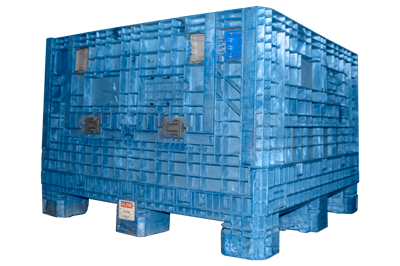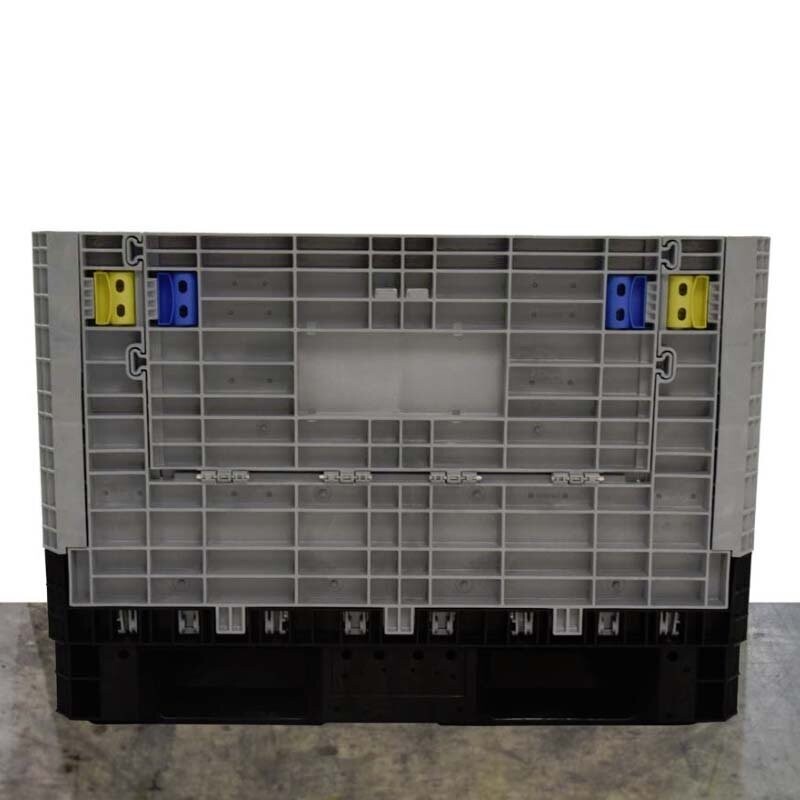Why used plastic containers are popular in food and manufacturing industries
Wiki Article
The Ultimate Guide to Picking the Right Bulk Containers for Your Business Demands
Picking the suitable bulk containers is essential for any business that counts on reliable logistics. Various sorts of containers exist, each designed for certain products and applications. Elements such as dimension, product compatibility, and governing criteria play a considerable function in this decision-making procedure. Understanding these aspects can result in enhanced operational effectiveness. Many businesses overlook crucial aspects that might improve their overall performance and sustainability. What are these considerations?Comprehending Different Types of Bulk Containers
Mass containers work as important tools for services looking for efficient storage space and transport remedies. These containers are available in numerous types, each developed to fulfill particular operational requirements. One usual type is the intermediate bulk container (IBC), which is ideal for granulated and liquid products, supplying an equilibrium of capability and maneuverability. An additional preferred option is the bulk bag, or FIBC, ideal for dry, flowable products. These versatile containers are light-weight and can be conveniently delivered and saved. For much heavier products, rigid mass containers are usually used, supplying durability and security for risk-free handling. Additionally, there are customized containers tailored for harmful products, guaranteeing conformity with safety and security guidelines. Comprehending the distinctive attributes of these mass container kinds enables organizations to make informed decisions that maximize logistics and reduce costs. By picking the right container, companies can improve their functional efficiency and streamline their supply chain processes.Secret Material Factors To Consider for Bulk Containers
When picking bulk containers, it is vital to consider the products utilized in their building. Aspects such as stamina, chemical, and sturdiness compatibility play a crucial duty in making sure the containers meet specific operational needs. In addition, weight and transportability issues can influence both effectiveness and transport logistics.Material Durability and Strength
Sturdiness and strength are vital consider choosing materials for mass containers, as they straight affect the container's capability to endure numerous environmental problems and dealing with procedures. Products such as high-density polyethylene (HDPE), polypropylene, and stainless steel are frequently favored for their durable buildings, offering resistance to influence, abrasion, and temperature level fluctuations. The option of material also affects the general lifespan of the container; more powerful products typically result in less frequent substitutes, causing cost financial savings in time. Furthermore, the weight of the product can influence shipping prices and ease of handling. Businesses must consider their certain functional settings and the potential for wear and tear to assure peak sturdiness and toughness in their mass container selection.Chemical Compatibility Factors
Recognizing chemical compatibility is necessary for picking mass containers, as the products made use of need to withstand the details materials they will hold. Numerous elements affect compatibility, including the chemical nature of the contents, temperature, and period of storage. Harsh chemicals might call for containers made from stainless steel or specialized plastics that stand up to destruction. In addition, reactive substances can produce heat or gases, necessitating vented or pressure-rated containers. The choice of container material, whether polyethylene, metal, or polycarbonate, need to align with the chemical residential or commercial properties of the saved materials to prevent violations or leakages. Ultimately, a complete assessment of these compatibility elements ensures risk-free handling and storage space, shielding both personnel and the environment while maintaining product honesty.Weight and Portability Worries
Choosing mass containers entails not just assessing chemical compatibility yet additionally considering weight and portability. Businesses need to analyze the convenience of handling and transportation to enhance performance. Light-weight materials like high-density polyethylene (HDPE) or light weight aluminum can assist in simpler activity and reduce delivery prices. On the other hand, heavier containers may provide improved sturdiness but can prevent wheelchair, specifically in atmospheres calling for frequent relocation. Additionally, the layout of the container need to enable for convenient training and stacking, making sure ergonomic security for workers. Companies ought to also take into consideration the framework offered for transportation; for instance, containers compatible with forklifts or pallet jacks can streamline operations. Eventually, the right balance in between weight and mobility directly affects operational effectiveness and expense effectiveness.Sizing Your Mass Containers for Ideal Performance
When sizing bulk containers, services have to thoroughly examine the measurements required to accommodate their particular items. Furthermore, weight capacity is an essential factor that influences effectiveness and security during transport and storage space. Effective sizing not just optimizes space but also maximizes functional operations.Identifying Container Capacities
Choosing the right dimensions for bulk containers is essential for taking full advantage of effectiveness in storage and transport. Companies should examine their details demands, thinking about variables such as readily available area, the nature of the products being kept, and the techniques of transport utilized. Precise measurements guarantee that containers fit preferably in cars and warehouses, reducing wasted area and lowering taking care of time. website Requirement sizes can offer convenience, yet personalized measurements may be required for unique requirements or to fit specific products. Additionally, it is very important to review piling capacities and availability, as these factors affect overall functional efficiency. Inevitably, the ideal measurements lead to improved company and structured logistics, profiting the overall performance of the organization.Weight Capability Considerations
Understanding weight ability is vital for organizations intending to enhance their mass container performance. The weight capability of a container directly impacts storage space abilities, transportation logistics, and total operational expenses. Selecting containers with the ideal weight limits ensures that companies can safely save and transport their items without running the risk of damage or compliance problems. Straining containers can result in structural failures, while underutilizing capacity lead to wasted sources. It is very important for organizations to analyze their item weights and consider any type of regulatory needs when choosing containers. Additionally, variables such as the kind of material, intended usage, and environmental conditions ought to likewise influence weight ability decisions. By evaluating these components, companies can boost efficiency and ensure a structured supply chain.Governing Conformity and Safety Standards

Regulative compliance and security criteria play an essential role in the choice of mass containers for organizations. Organizations needs to assure that their containers satisfy various laws established by regional, national, and global authorities. These standards frequently pertain to material safety, structural integrity, and appropriate labeling, which aid avoid accidents and ensure the secure transportation of products.
Additionally, adherence to industry-specific guidelines, such as those from the Food and Medication Administration (FDA) or the Occupational Security and Health Management (OSHA), is important for business handling dangerous materials or foodstuff. Non-compliance can result in penalties, legal concerns, or damages to an organization's online reputation.
Businesses ought to additionally think about the container's compatibility with the materials being kept or transported to avoid contamination or chain reaction (used collapsible bulk containers). To summarize, recognizing and applying regulative compliance and security standards is vital for the reliable and accountable usage of mass containers
Sustainability Options for Eco-Friendly Bulk Containers

Companies are also discovering choices made from recycled materials, which not just save sources however additionally support the recycling market. Advancements in style enable for lighter containers that require much less energy to transportation, better enhancing sustainability. By integrating these environment-friendly mass container choices, businesses can show their dedication to ecological stewardship while satisfying consumer need for lasting practices. This change not just assists the planet however can additionally enhance brand reputation and customer loyalty.
Cost-Effectiveness and Budgeting for Mass Containers
While several services concentrate on sustainability, cost-effectiveness remains a crucial variable when selecting mass containers. Organizations has to analyze the first purchase rate, along with lasting functional costs, to guarantee economic practicality. Elements such as toughness, upkeep, and reusability play a considerable duty in establishing overall expenses.Purchasing premium containers may produce higher upfront costs yet can lead to savings with decreased replacement rates and reduced waste. Furthermore, companies should consider transport costs and storage space effectiveness, as these can impact the general budget plan.

Regularly Asked Concerns
How Do I Determine the Right Container for Hazardous Products?
To identify the appropriate container for harmful materials, one must review compatibility with the material, consider the container's material, look for regulatory compliance, and evaluate capacity and security functions to guarantee proper handling and storage space.Can Bulk Containers Be Custom-made for Particular Products?
Yes, bulk containers can be customized for specific items. refurbished bulk containers. Numerous attributes, such as dimension, material, and style, can be customized to meet special requirements, making certain ideal safety and performance for transferring and storing various itemsWhat Is the Ordinary Lifespan of Various Bulk Container Types?
The average life expectancy of bulk container types differs; plastic containers last 5-10 years, steel containers 10-20 years, and wooden containers usually last 3-7 years, relying on usage, maintenance, and ecological conditions.Exactly how Should I Clean and Maintain Bulk Containers?
To clean and preserve bulk containers, one must frequently evaluate for damages, eliminate deposit, wash with suitable cleaning agents, rinse extensively, and warranty appropriate drying before storage space. Complying with maker guidelines boosts durability and safety and security throughout use.Exist Rental Alternatives for Bulk Containers Available?
Yes, various business use rental alternatives for mass containers, providing adaptability for services. These services can suit various demands, allowing firms to manage inventory efficiently without the commitment of purchasing containers outright.Resilience and stamina are important aspects in picking products for bulk containers, as they directly affect the container's ability to hold up against numerous ecological problems and managing processes. Recognizing chemical compatibility is essential for selecting bulk containers, as the materials made use of should withstand the details substances they will certainly hold. Understanding weight ability is important for businesses intending to optimize their mass container effectiveness. Regulative conformity and safety criteria play a crucial role in the selection of mass containers for services. While lots of organizations concentrate on sustainability, cost-effectiveness remains an important element when selecting bulk containers.
Report this wiki page